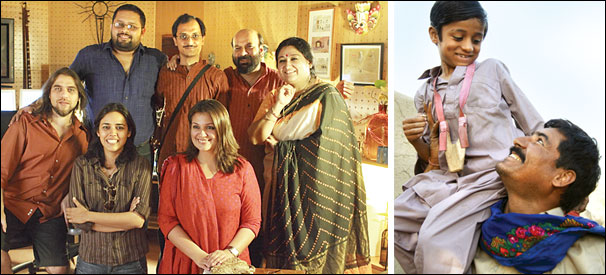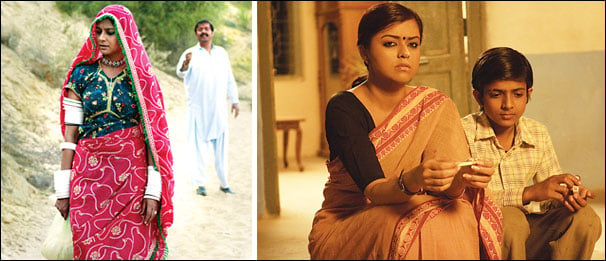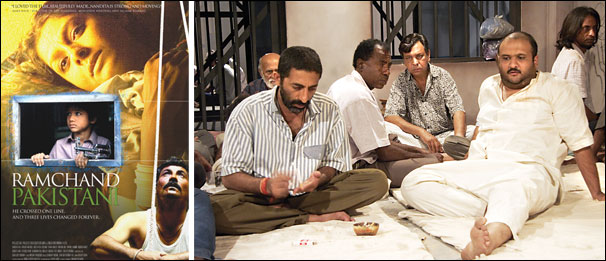|
|
| |
instep
analysis
Films are not always what they seem
Putting Ramchand Pakistani in perspective
Ramchand Pakistani is being plugged as a real life political drama
when in truth it is the story of a little boy coming of age in a
prison populated by characters that will make you laugh and cry
even as they make you think.
By Muniba
Kamal |
| |
| It
is the film we have all been anticipating since Khuda Kay Liye and
yet some people I know have been put off by the promos, Nandita Das
in a starring role, a Pakistani Hindu Dalit boy who crosses the border
running away from anger from his mother, a father who follows him
and the Indian patrollers who arrest them and put them in prison do
not make the kind of a film that most people are dying to see. And
unfortunately, as a nation we are used to taking things at face value. |
| |
 |
| |
|
Ramchand Pakistani is being plugged as a film about
"three lives changed by the vagaries of Pakistan-India relations".
That is the angle that the international press has taken and Ramchand
Pakistani has definitely made waves internationally. Reuters calls
it a true-life Pakistan border drama and said that 'Ramchand Pakistani
follows the young Hindu boy of the title, as he accidentally steps
over the ill-defined border between old rivals India and Pakistan'.
Across the border The Hindu calls Ramchand Pakistani 'a film project
with a difference' and the article opens with the words "'Two
nations poised for war. One family torn apart' reads the tag line
for the soon-to-be-released film Ramchand Pakistani. While this
dramatic description would seem to fit the bill for any of the numerous
war movies Bollywood has produced, Ramchand… is a film project
with a difference. The first-ever film from Pakistan whose main
characters are from the country's minority Hindu community, Ramchand
seeks to emphasise the commonality between the people of the two
countries rather than focus on the differences and the violence,
as many Bollywood movies have tended to do."
All
the publicity, promotion and numerous articles the film has spawned
seem to miss the point. Ramchand Pakistani sounds like a film with
socio-political overtones, when in fact it is a film with socio-political
undertones. It is very much a film with a heart that focuses on
the love between a husband and wife and their child, their pain
at their unfortunate parting, the bonds formed in prison between
the men who find themselves their and the unlikely bond between
a higher caste police inspector forms with a Dalit child. At face
value, Ramchand Pakistani may be about India-Pakistan relations,
but as a film it transcends them, painting characters that are true
to life, that we can relate to, who we laugh with and cry with.
And the most lovable of them are the two Ramchands.
Mehreen
Jabbar has found two gems. The younger Ramchand is played by the
incredible Syed Fazal Husain who is a child actor on television.
Ramchand Pakistani is his feature film debut and his performance
reminds one of that of Darsheel Safary in the excellent Taare Zameen
Par. There are similarities between the two. While Ishaan in Taare
Zameen Par struggles with his dyslexia and is overcome by remorse
and self doubt for not performing well, Ramchand has a similar crisis
of conscience in the film. He is manhandled by Indian army personnel,
gets himself arrested along with his father and sees his father
being tortured in prison, all because he ran away. Syed Fazal Hussain
looks bewildered as a boy taking it all in, and when he finally
breaks down in his father's arms in prison after seeing a mentally
unstable prisoner having a fit, you can't help but cry with him.
And then there is perhaps the most touching scene of the film, when
Ramchand finds a beetle and puts it in a match box, to play with
at night. The joy on his face when he takes it out is that of a
child who's just been given a new toy, which is precisely what the
beetle is for him. That is a quintessential Mehreen Jabbar touch.
She looks at Ramchand as a child, and that he happens to be a prisoner
through circumstance is only a backdrop to his emotions.
|
| |
 |
| |
And
it is touches like these that dot every scene of the film that make
Ramchand Pakistani a great film.
The older Ramchand (four years after the imprisonment) is played
by Navaid Jabbar. Mehreen Jabbar discovered him in Mirpurkhas where
he works as a mechanic with his father.
Navaid is a student, Ramchand Pakistani is his first acting job
and what a debut he makes! Four years on, when Syed Fazal Hussain
makes an exit and Navaid Jabbar arrives, it is clear that prison
life has worked wonders for Ramchand. He is street smart, able to
hold his own with the prisoners and get his way with prison guards
to whom he has endeared himself to over the years. Thanks largely
with the help of the benign police woman Kamla played by Maria Wasti
who is a revelation and my personal favourite character in the film.
Kamla
is a Hindu, very proper and strict, but a woman at heart. She meets
the younger Ramchand and immediately gets clothes to fit him. But
of course she doesn't like it when she discovers that he is Dalit
(Untouchable). She gets him trained to sweep the floor, make tea
and run errands like getting her video tapes of Bollywood films
to watch in her office. But along with this, she educates him, teaches
him to read and write and cares for him. He in turn becomes her
eyes and ears in the prison and covers up for her when she is carrying
on an affair with a policeman Deepak in her room. The most radical
scene (in terms of Ramchand Pakistani being shown in India) is when
she is leaving prison to marry Deepak. She gives Ramchand a kiss
on the cheek and he smiles up at her. The relationship between them
over a period of five years bridges the physical divide between
Brahmin and Dalit. It a poignant moment, one that to my mind has
never been shown by any Indian director.
The last film that one remembers that touched on the Brahmin-Muslim
divide was Aparna Sen's excellent Mr and Mrs Iyer. In the film,
Meenakshi Iyer who is a devout Hindu Brahmin is traveling by bus
at a time when communal riots break out in India. Her companion
on the bus is Raja Chowdhary, a Muslim photographer. She will not
drink from the same glass as him, but when the bus is attacked by
Hindu hardliners, she claims that he is her husband and saves him.
Lost in the riots, the two develop a relationship that comes very
close to passion, but that remains unrealized. Had they consummated
their relationship, perhaps riots would have broken out against
the film in India again. Anyhow, that was a bridge director Aparna
Sen chose not to cross. Mehreen Jabbar does it with ease, using
the maternal instinct of a Brahmin woman for a Dalit child. I wonder
if an Indian director would have done the same. It is nuances like
this that make Ramchand Pakistani a landmark film. Mehreen Jabbar
as a storyteller follows a low key text, but the subtext of her
work always packs a punch. Those who have followed Nivala, Marhoom
Colnel Ki Betiyaan and other teleplays will know this.
|
| |
 |
| |
And ultimately, the two locations of her film, the village in Thar
and the prison across the border in India don't employ magnificent
sets but they are real. And they allow for a real story to be played
out. Mehreen and her crew were let into an Indian prison in Bhuj as
a reference point for the sets that were then recreated in Karachi.
The village was shot in the Thar desert in Pakistan to capture the
stark beauty of the landscape. And yet it is the stories that pan
out here that are important.
The village in Thar is where Champa (Nandita Das), Shankar (Rashid
Farooqui) and Ramchand (Fazal Husain) live and love in the harshest
of conditions. After father and son are arrested, the village becomes
a place where Champa pines for them. She doesn't know where they are
and she almost gives them up for dead but then doesn't. When her brother
comes to take her away (Tharis migrate during the harsh summer months)
she runs away and hides in the village ruins. And in this village,
as the years go by, she is also attracted to Abdullah (Noman Ijaz)
who also feels for her. Yet, nothing happens because a Muslim marrying
a Hindu woman is as much of a taboo in Pakistan as a Brahmin woman
kissing a Dalit boy is in India.
Nandita Das is superb as Champa. But it is a role she has played before,
most notably in Bhawander, so her performance doesn't come as a surprise.
Rashid Farooqui is Shankar is a revelation though. A TV actor with
a great reputation, Ramchand Pakistani elevates him to another position
altogether as a big screen actor.
And then there is the prison and the many characters that populate
it. There is a Muslim Indian police inspector (Shahood Alavi) who
feels for Shankar and Ramchand but can do nothing about the system.
There is Deepak (Hasan Niazi) who secretly conducts an affir with
Kamla (Maria Wasti). There is a Mullah (Iqbal Motilani) who is sick
and tired of the prison food that is largely meatless. There is Vishesh
(Salim Meeraj) who loses his mind in prison haunted by demons that
remain unexplained. There is Moti (Adarsh Ayaz) a small time crook
who reads the newspaper out to prisoners and smokes joints in the
prison.
There is Baba Gull (master Yaqoob) the paternal figure in the prison
who deals with Ramchand with great humanity and is the buzurg (wise
old man) loved by all. There is the Professor (Kasim Raza) a sexual
predator who tries to lure Ramchand with biscuits and gets a beating
from other prisoners. There is Sharma (Adnan Shah) a politician who
manages to secure a release though his political connections.
In the press kit, the special aspects of Ramchand Pakistani are mentioned.
It is possibly the first Pakistani film where the characters are Pakistani
Hindus. It is adapted from actual events about what happened to a
boy and his father during the tension between India and Pakistan in
2002.
It is a collaborative effort between talent from India and Pakistan
but it is a Pakistani story at heart. It deals with the affect the
Pakistan-India conflict has on human lives. But to me all these aspects
of the film, while going down in the history of Pakistani cinema are
peripheral to the viewers. The biggest danger of the way the film
is being plugged is that many Pakistanis might be put off by the sheer
worthiness of the project.
The comparisons between Ramchand Pakistani and Khuda Kay Liye are
being made. And one hopes that Ramchand is as big a hit as its worthy
predecessor. When it is finally released in three days on August 1,
it will be the acid test of how Pakistani viewers will react. Did
Pakistan flock to see Khuda Kay Liye because as a nation we like good
stories or did we all head for the theatres because the film generated
so much controversy that everyone wanted to see what the fuss was
about? The box office reception of Ramchand Pakistani that has no
glamour will be revelation when the film is released. After all, let's
look realistically at the differences between the two. Ramchand has
Nandita Das as a village woman as opposed to Iman Ali as a London
returned. It has two little boys as playing the lead character as
opposed to Lollywood megastar Shaan. It is based in a village and
a prison at the Indian outpost as opposed to Lahore, America and London.
In the strangest way, Ramchand Pakistani will reveal so much about
this nation's taste in cinema.
But there is hope in one's heart that by word of mouth word will spread
and people will flock to theatres. And that they will do so because
as a nation we have an abiding love for stories well told. That the
glory days of national television when our dramas made waves across
the border will come back to our big screen. This is what one is hoping
for but when one hears reports that the cinematic dud Love Story 2050
is running house full in Pakistan despite bombing in India, one's
heart sinks. Here's hoping that Ramchand Pakistani does well.
But Ramchand Pakistani has been made and it is a fantastic cinematic
experience. So to Mehreen Jabbar, one can only say, "Well done
and thank you!" |
| |
|

